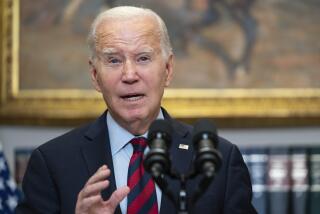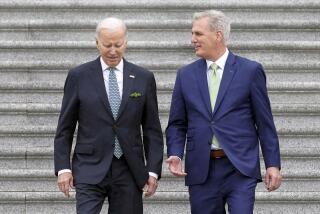A Chance to Refocus on Policy
- Share via
WASHINGTON — The Republican members of Congress who voted to impeach President Clinton and run him out of town are surely at the top of his personal grudge list. Nonetheless, Clinton is resolved to make the most of his last two years in office by holding his nose, rolling up his sleeves and cutting deals with some of his would-be political assassins.
“In politics and government, you don’t have the luxury of thinking about who you like or don’t like in deciding who you deal with,” said Douglas Sosnik, a top political advisor to the president on politics and policy. “It’s simple. Look at the math. In a divided government, if you’re going to get anything done, both parties have to work together.”
After 13 humiliating months, during which the hottest topic of public conversation was Clinton’s liaison with a woman half his age and his effort to cover it up, the president is more determined than ever to leave a legacy of accomplishment.
His agenda for the next two years focuses on policy priorities--like saving the budget surplus to use in the future for Social Security and Medicare that can only be accomplished by winning Republican support. To do so, the president will do what he has done in the past--give the Republicans something they want, in this case probably tax cuts--in exchange for supporting his priorities, his advisors said.
Collaboration Has Brought Results
The president’s most memorable achievements--from balancing the budget to reforming the welfare system--have come through collaboration with GOP leaders, regardless of the wishes of congressional Democrats. That modus operandi, say his advisors, will not change now that he has been acquitted in the Senate.
Another goal of the president is to boost chances for congressional Democrats to take back both the Senate and the House from Republican rule, and for Vice President Al Gore to win the presidency in 2000. Those victories would reaffirm Clintonism and guarantee that his programs would not die at the end of his term.
But this may create challenging conflicts for Clinton, who may not always move in lock-step with his Democratic allies--or even his loyal vice president. Aides say he will raise mountains of money to help them but is not willing to forgo legislative achievements to do so.
Many of the congressional Democrats who saved Clinton’s skin by uniting behind him want the president to repay them by spending his final months in the White House preparing a launching pad for them in the 2000 election. They want him to refuse to compromise with Republicans, leaving Democrats with potent causes for their campaigns.
White House advisors caution that although the president is grateful to Democrats for standing by him, he’s not about to sacrifice the rest of his presidency to position them for 2000.
“The president has demonstrated again and again that first and foremost he is committed to getting things done for the American people. There have been times in the past when people thought it was best to posture politically, but he chose action instead,” one senior White House advisor said. “If we can come to agreement on legislation that matches closely to our goals and legislative objectives, we’re going to go for it.”
Some Clinton supporters are alarmed that after all the Democrats did for him, the president would subordinate the best interests of the Democratic Party to his concern for his own legacy.
“These folks not only took him to the dance, but they danced and danced and danced with him,” said one former top White House official. “I just think he owes his presidency to the Democrats that stuck with him. He owes the Democrats using his bully pulpit to maximize their advantage going into the 2000 elections.”
But even that longtime advisor said that Clinton’s deeply ambitious, self-centered nature will make it difficult for him to make anything his priority except “getting stuff on the books for him to crow about.”
The president’s accomplishment-oriented personality and the way he has governed in the past are the best predictors of how Clinton will use his remaining time.
“Whether it means working with Republicans or working with Democrats, he will do whatever is possible to end his presidency on a positive note,” said Leon E. Panetta, a former chief of staff for Clinton.
Neither Party May Prove Agreeable
In the summer of 1996, during his reelection bid, Clinton turned a deaf ear to the Democratic Party when he embraced the GOP-drafted welfare overhaul. Since then, he has repeatedly pointed to that decision as one of his greatest accomplishments. Starting in 1995, Clinton made deal after deal with the congressional Republican leadership to bring the federal budget into balance. With almost no exceptions, congressional Democrats balked at his willingness to compromise with the enemy. But now, Clinton points to the first budget surplus in three decades as a landmark accomplishment.
“There’s enough [money] to go around. Everybody can declare victory at the end of the day,” said one White House advisor.
But there is no guarantee that either Democrats or Republicans in Congress will play along with Clinton in his effort to push major bipartisan legislation through the Congress.
Although some Republicans are eager to remind voters that they stand for something other than impeachment, others are so angry with Clinton that they recoil at the thought of joining hands with him in legislative efforts. Democrats, meanwhile, will not want to give Republicans legislative accomplishments, even if Clinton is willing to do so.
Given the ferocious level of partisanship that has characterized the public debate in Washington in recent months, observers worry that neither side will be in an accommodating mood.
“People have been punching each other so long that it’s become instinctive,” said Panetta, a former member of Congress from Carmel. “My concern is they’ll keep punching even if the blows don’t land.”
More to Read
Sign up for Essential California
The most important California stories and recommendations in your inbox every morning.
You may occasionally receive promotional content from the Los Angeles Times.













